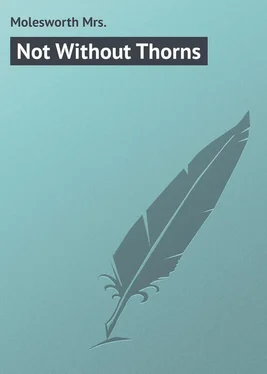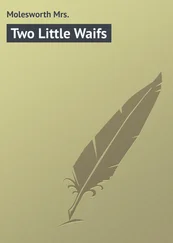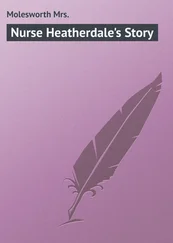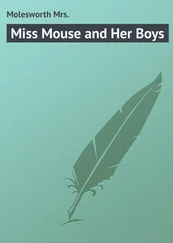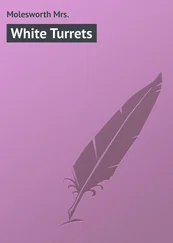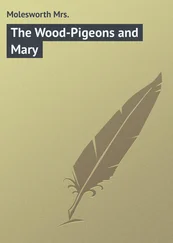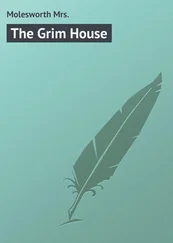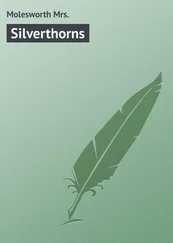Mrs. Molesworth - Not Without Thorns
Здесь есть возможность читать онлайн «Mrs. Molesworth - Not Without Thorns» — ознакомительный отрывок электронной книги совершенно бесплатно, а после прочтения отрывка купить полную версию. В некоторых случаях можно слушать аудио, скачать через торрент в формате fb2 и присутствует краткое содержание. Жанр: foreign_prose, на английском языке. Описание произведения, (предисловие) а так же отзывы посетителей доступны на портале библиотеки ЛибКат.
- Название:Not Without Thorns
- Автор:
- Жанр:
- Год:неизвестен
- ISBN:нет данных
- Рейтинг книги:4 / 5. Голосов: 1
-
Избранное:Добавить в избранное
- Отзывы:
-
Ваша оценка:
- 80
- 1
- 2
- 3
- 4
- 5
Not Without Thorns: краткое содержание, описание и аннотация
Предлагаем к чтению аннотацию, описание, краткое содержание или предисловие (зависит от того, что написал сам автор книги «Not Without Thorns»). Если вы не нашли необходимую информацию о книге — напишите в комментариях, мы постараемся отыскать её.
Not Without Thorns — читать онлайн ознакомительный отрывок
Ниже представлен текст книги, разбитый по страницам. Система сохранения места последней прочитанной страницы, позволяет с удобством читать онлайн бесплатно книгу «Not Without Thorns», без необходимости каждый раз заново искать на чём Вы остановились. Поставьте закладку, и сможете в любой момент перейти на страницу, на которой закончили чтение.
Интервал:
Закладка:
“He was very good to Sydney and me – always. We shall all be delighted to see him again,” said Eugenia, rousing herself to speak as heartily as she saw was expected of her. “Dear me,” she went on, thoughtfully, “it is three years since he went away!”
“He will hardly know us again,” said Sydney. “I was scarcely fifteen then.”
“Yet you are less altered than Eugenia,” observed Mr Thurston.
It was true. The younger girl, though not quite as tall as her sister, might easily have been taken for the elder. She had reached her full height at an earlier age than Eugenia, her figure was rounder, her expression of face less changeful.
“Suppose we change characters – Sydney passing for me and I for her – when Gerald first sees us?” suggested Miss Laurence.
She spoke idly; she was not prepared for Frank’s hasty reply.
“No, indeed. I should not like it at all,” he exclaimed abruptly. Eugenia raised her head and looked at him; her eyes opened to their widest. He coloured a little. “I mean to say,” he went on, hurriedly and rather incoherently, “I mean – it would be nonsense. He could not mistake you, and I don’t like practical jokes – I thoroughly disapprove of them,” he had quite recovered himself by now. “They are objectionable in every way; they offend against both good feeling and good taste.”
Miss Laurence made no reply. She felt no spirit to-day to argue with Frank, dictatorial though he was, and she did not want to vex Sydney again. She only thought the curate a great bore, and wished he would go. Her silence proved her best ally, for, as no one appeared inclined to dispute his last dictum, Mr Thurston’s attention returned to other matters.
“I must go,” he said, drawing out a shabby silver watch – he was always intending to treat himself to a better one, but there was a good deal of distress in Wareborough this winter – “I have a confirmation class at half-past six, and three sick people to see before that. Oh, by-the-bye, Eugenia, how did your party go off last night?”
“I never know what people mean by things ‘going off,’” said Eugenia, rather superciliously. “If you mean to ask me if I enjoyed myself, that is quite another thing.”
Frank Thurston laughed. He always felt pleasantly good-humoured and “superior” when Miss Laurence’s feathers showed signs of becoming ruffled.
“I suppose I may infer from that that you did enjoy yourself,” he replied, amiably. “But I mustn’t stay to hear your adventures, even if they were in my line, which they are not likely to be. You must be anxious to narrate them to Sydney, however, so I must be off.”
He shook hands with both sisters quickly, and left them; but, somehow, Eugenia no longer felt eager to “talk it all over” with Sydney. As the door closed on their visitor, she strolled to the window and stood there without speaking for some minutes, looking out at the garden. Sydney, contrary to her usual habit, had seated herself – out-door wraps, muddy boots, and all – near the fire, and her sister’s silence surprised her.
“Did you not enjoy yourself last night, Eugenia?” she said at length, with some hesitation.
“I don’t know,” was the reply. The words were ungracious, but the tone wearied and dispirited.
“Is anything the matter?” asked Sydney again, after waiting to see if Eugenia had nothing more to say.
“Oh no – nothing. I am only cross. Don’t mind me, Sydney. I’ll tell you all there is to tell when I’m in a better humour. Oh, Sydney!” she broke off, abruptly, “how dreadfully ugly this garden is!” She was still staring out of the window. “I do hate this sort of half-town half-country garden. I wish you hated things too, sometimes, Sydney – it would be a comfort to me.”
“Would it?” said the younger girl, quietly. “I am not so sure of that.” But she got up from her seat as she spoke, and, crossing the room to her sister, stood beside her at the window. There seemed something soothing in her near presence. Eugenia’s face cleared a little.
Certainly the prospect was not an attractive one. A suburban garden is seldom satisfactory, and this one was no exception to the rule. There was about it none of that strange, touching charm of contrast, of unexpected restfulness, which affects one so curiously in some town gardens. It was too far out of the town for that, and even had it not been so, Wareborough, grim yet not venerable, was not the sort of place in which such an oasis could exist. Wareborough dirt was neither mould nor decay, but unavoidable nineteenth-century dirt, fresh from the factories and the tall chimneys. Wareborough noise was the noise, obtrusive and unmistakeable, of the workshop and the steam-engine – no muffled, mysterious roar: at no hour of day or night could Wareborough, distinct from its human element, inspire any but the most practical and prosaic sentiments; and Eugenia Laurence was of the nature and at the age to chafe and fret greatly at such surroundings. For she had not hitherto penetrated much below the surface of things: indignant as she would have been at the accusation, poetry and beauty were as yet known to her but in very conventional clothing. She had not yet learned to feel the beat of the universal “mighty heart,” nor been moved to tears by “the still, sad music of humanity.” And in such a mood as to-day’s, this unlovely garden caused her actual pain. Yet there was something to be said for the poor garden after all. It was praiseworthy even while almost provoking to see how very hard the stunted shrubs struggled for existence; a pitiful sort of consciousness seemed to pervade the whole of having known better days, of having in past years been pretty and flourishing, though now slowly but surely succumbing to the adverse influences of the ever-increasing building in the vicinity – the vast army of smuts, the year by year more heavily laden air.
“I wish,” said Eugenia, at length, “I wish we either lived quite in the middle of a great town – I shouldn’t mind if it were in the heart of the city even, in London, I mean – or quite, quite in the country. Up on the top of a hill or down in the depths of a valley, I don’t care which, provided it was out of sight and hearing of railways and omnibuses, and smoke and factories, and – and – ”
“And shops?” suggested Sydney. “Shops and perhaps churches?”
“No, I like shops. At least, I like buying nice things. You know I do, Sydney – you are laughing at me,” reproachfully. “It isn’t nice of you when I am speaking seriously and want you to be sympathising. As for churches,” she went on, languidly, “I am not sure if I would rather be without them or not. It is one of the points I have not quite made up my mind upon yet. Don’t look so shocked child, I only said churches – I didn’t say clergymen; and of course, even up on the top of my hill there would be sure to be a church, with no music, and sermons an hour long.”
“Eugenia, what nonsense you do talk sometimes!” exclaimed Sydney, when her sister at last stopped to take breath. “I cannot understand how you, who are really so clever, can go on so. It doesn’t matter with me, of course, but a great many people wouldn’t like it at all – wouldn’t understand that you were in fun.”
”‘A great many people’ left the room ten minutes ago, my dear Sydney,” replied Eugenia, coolly. “Don’t distress yourself about me. We have each our special talents, you know; perhaps mine is talking nonsense. It is a great gift, but of course, like all great gifts, it requires cultivation.”
Sydney did not reply; she turned away, and moved slowly towards the door.
“I must go and take my things off,” she said, quietly.
“No, you mustn’t; at least, not till I let you,” exclaimed Eugenia. “Now, Sydney, don’t be tiresome. You are not to get cross; I’ve been quite cross enough for both. You should be glad to see I’ve talked myself into a good humour again. Come here, you crabbed little thing!” she pulled Sydney with her down into her old place in front of the fire; “and if you will be good and nice, I’ll tell you about last night. Oh, Sydney it was – I can’t tell you what it was – it was so delightful. I never thought anything in the world could be half so nice.”
Читать дальшеИнтервал:
Закладка:
Похожие книги на «Not Without Thorns»
Представляем Вашему вниманию похожие книги на «Not Without Thorns» списком для выбора. Мы отобрали схожую по названию и смыслу литературу в надежде предоставить читателям больше вариантов отыскать новые, интересные, ещё непрочитанные произведения.
Обсуждение, отзывы о книге «Not Without Thorns» и просто собственные мнения читателей. Оставьте ваши комментарии, напишите, что Вы думаете о произведении, его смысле или главных героях. Укажите что конкретно понравилось, а что нет, и почему Вы так считаете.
